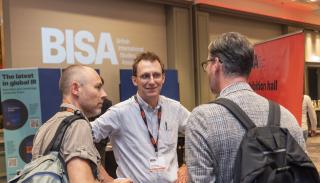
Breadcrumbs navigation
In discussion: Andrew Dorman
We recently announced the election of new members of our Executive Committee. We hope this interview series, one with each new trustee, will help you get to know them a little better. This time it's the turn of Andrew Dorman who is based at King's College London.
Tell us a bit about yourself and where you are from
I grew up in a small Essex village called Little Hallingbury on the Hertfordshire-Essex border near the market town of Bishop’s Stortford. I undertook a History and Politics degree in Sunderland (1984-7) and then trained and qualified as a Chartered Accountant with KPMG in their Cambridge office in 1991. Having qualified in a period of recession I was then made redundant three weeks before I got married. I subsequently switched careers undertaking a masters and doctoral degrees at the University of Birmingham. I held a fixed-term lectureship at Birmingham and then picked a permanent position initially at the Royal Naval College Greenwich and then from 1997 onwards at the new Joint Services Command and Staff College initially as a civil servant and from 2000 onwards working for King’s College London.
Why did you want to be a BISA trustee and what do you hope to achieve during your term?
BISA has always provided an important role in my career. I attended my first BISA conference in 1991 as a masters student and delivered my first paper in 1993. As a trustee, I hope to help BISA’s ongoing mission to support its members, develop the Association’s wider public engagement and support the work securing the Association’s long term financial future.
What is your area of research and how did you get into it? What are you currently working on?
My research focuses on the interaction of policy and strategy, utilising the case studies of British defence and security policy and European security. I have always been interested in why there is so often a disconnect between the aspirations of governments and the actions that subsequently follow (or don’t). As part of this I have been fortunate to be able to engage with different parts of government, parliament and the armed forces, and currently hold a Leverhulme Research Fellowship.
You were the editor of International Affairs for a decade. What were your highlights? What transferable skills do you think this kind of role can develop?
I had a really enjoyable decade as editor of International Affairs, the Chatham House journal published by Oxford University Press. For me three things stood out. First, as a journal that covered the whole field it provided a great opportunity to engage in areas that I had not previously really looked at and to see some really ground-breaking scholarship. Second, I was blessed to work with a great team who were keen to push the boundaries and take risks. At conferences I was regularly being thanked for the support the team had provided to individual authors. Third, it was always a real delight to see new authors being published in the journal, and particularly the delight they had in looking at a hard copy.
I would recommend being part of an editorial team. I think in my own work I have become a better writer simply through reading other people’s work. You get a real insight into what editorial teams and reviewers look for and how to strengthen your own work. I also found that reading a lot of material outside my research field frequently gave me fresh insights into my own field.
Is there anything else we should know about you?
Other things to note would include my support for Ipswich Town, I am now into my second decade of running badly as a mid-life crisis, and I am really enjoying being a grandfather.